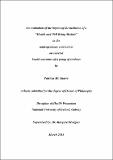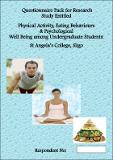| dc.contributor.advisor | Hodgins, Margaret | |
| dc.contributor.author | Mc Sharry, Patricia | |
| dc.date.accessioned | 2013-11-14T10:32:43Z | |
| dc.date.available | 2013-11-14T10:32:43Z | |
| dc.date.issued | 2013-03-27 | |
| dc.identifier.uri | http://hdl.handle.net/10379/3817 | |
| dc.description.abstract | The aim of this study was to evaluate the impact of a pilot intervention designed to improve physical activity, healthy eating and psychological well-being in a group of third level students in a rural college setting. The nature of the intervention was that of a curriculum based, educational, individual health behavioural change approach with first year undergraduate students using group motivational interviewing. The intervention was delivered in the form of a new module entitled Health and Well-being incorporated into the undergraduate nursing degree curriculum. The evaluation of this intervention employed a mixed methods approach including a quasi-experimental design to evaluate the impact and outcome of the intervention while a focus group was utilised to evaluate the process of the intervention. The study population consisted of a non-probability purposeful sample of 110 students divided into an intervention and a comparison group. Data collection tools included a health behaviour questionnaire incorporating a mixture of self-reported measures, objective measures and a focus group interview. Quantitative data was analysed by SPSS and thematic content analysis was utilised for the focus group. Findings indicated a significant increase in physical activity between pre and post intervention within the intervention group, however these increases were not maintained. The healthy eating element of this intervention was largely ineffective. Both groups gained weight between pre and post intervention however a statistically significant weight gain was found in the comparison group only. A statistically significant increase in psychological well-being in the intervention group between pre and post intervention indicated that this intervention improved psychological well-being in this group; on the other hand a large decrease in psychological well-being in the comparison group over the year may indicate that all students could benefit from a similar psychological well-being intervention. Findings from the focus group reinforced the stressful nature of student life and indicated that many students experience psychological distress. It is concluded that the stressful nature of this adjustment period renders first year college students unable to take on board any other form of health lifestyle behavioural change at this point. | en_US |
| dc.rights | Attribution-NonCommercial-NoDerivs 3.0 Ireland | |
| dc.rights.uri | https://creativecommons.org/licenses/by-nc-nd/3.0/ie/ | |
| dc.subject | Health Promotion | en_US |
| dc.subject | Student health behaviours | en_US |
| dc.subject | Physical actiivty | en_US |
| dc.subject | Healthy eating | en_US |
| dc.subject | Psychological well being | en_US |
| dc.title | An evaluation of the impact of a health and well-being module on selected health outcomes of undergraduate students | en_US |
| dc.type | Thesis | en_US |
| dc.local.note | Within this thesis, the researcher implemented a new module entitled health and well being in the undergraduate Nursing curriculum. The researcher then examined whether this module had an impact on the health behaviours of the students who undertook this module in comparison to students who did not receive this module. | en_US |
| dc.local.final | Yes | en_US |
| nui.item.downloads | 1708 | |



